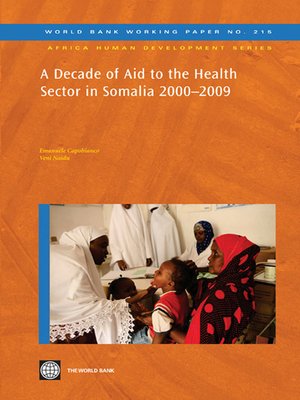
Sign up to save your library
With an OverDrive account, you can save your favorite libraries for at-a-glance information about availability. Find out more about OverDrive accounts.
Find this title in Libby, the library reading app by OverDrive.



Search for a digital library with this title
Title found at these libraries:
| Library Name | Distance |
|---|---|
| Loading... |
This study reviews trends in aid provided to the health sector in Somalia over 2000?2009. It is a testimony to the commitment of donors and implementers who have relentlessly tried to improve the dire health situation of millions of Somalis. At the same time, this study is a wake-up call for all donors and implementers. Have donors been generous enough? Have millions of dollars been invested in the most efficient way to maximize results? Did donors choose the right priorities? Did they stay the course? Did they learn from their own mistakes? The answers are mixed. Donors stepped up their contributions over the decade: some new financiers came, some others left, but overall, financial support has been constantly increasing. Emergencies took up 30 percent of the overall funding, thus demonstrating the impact on the health sector of man-made and natural disasters. Only 20 percent was allocated for horizontal programs, with increasing funds over the last part of the decade. Vertical programs dominated aid financing for health: in the case of AIDS, TB, and malaria, the generous funding of the last years of the decade do not appear justifiable. Malnutrition, EPI, and reproductive health programs never got the attention they deserved. The key conclusion of this study is that donors? funding for public health in Somalia over the past decade could have been used more strategically. Better coordination among donors, local authorities, and implementers is now needed to avoid the mistakes of the past and to ensure that priority setting for future interventions is more evidence based and more results oriented.







